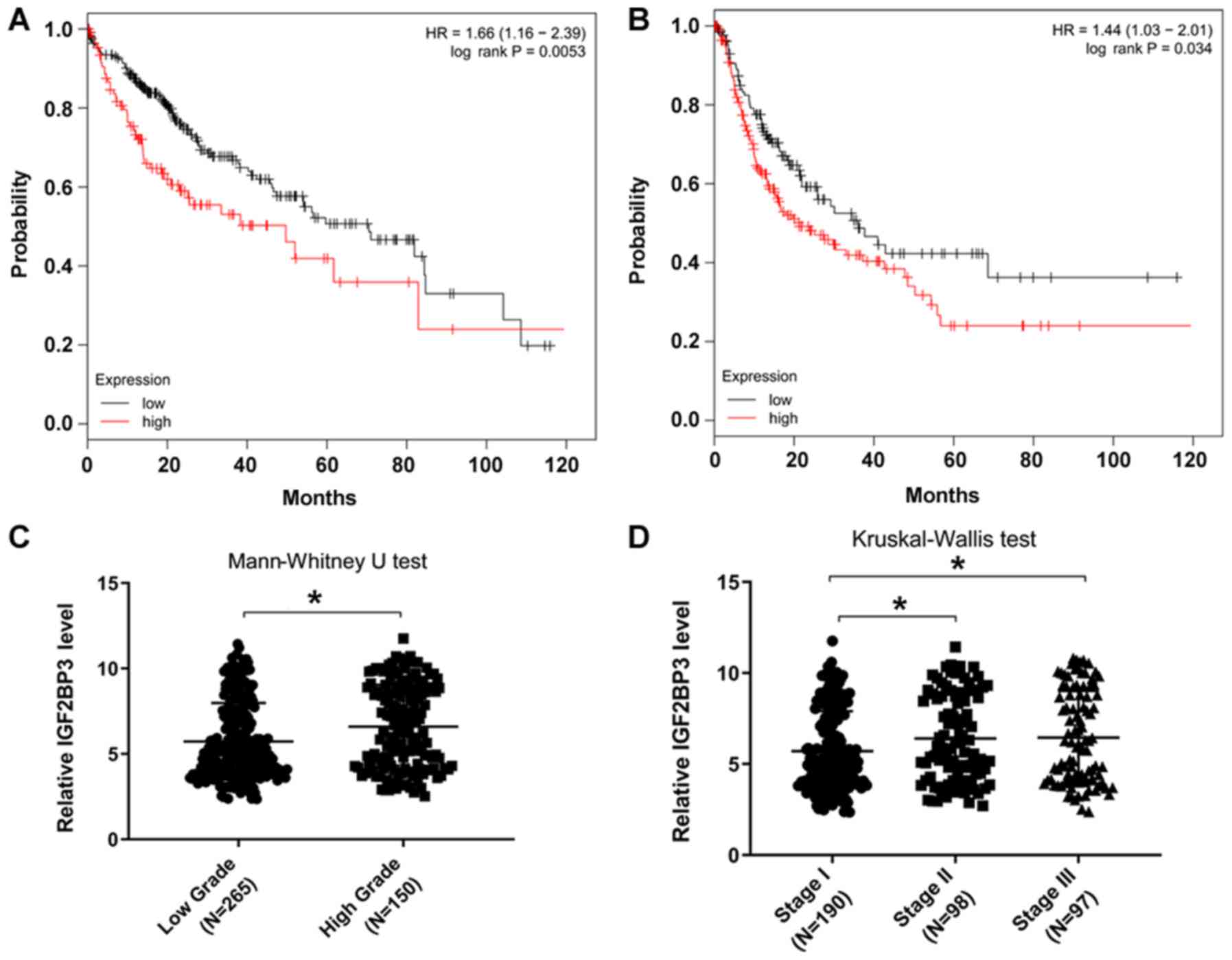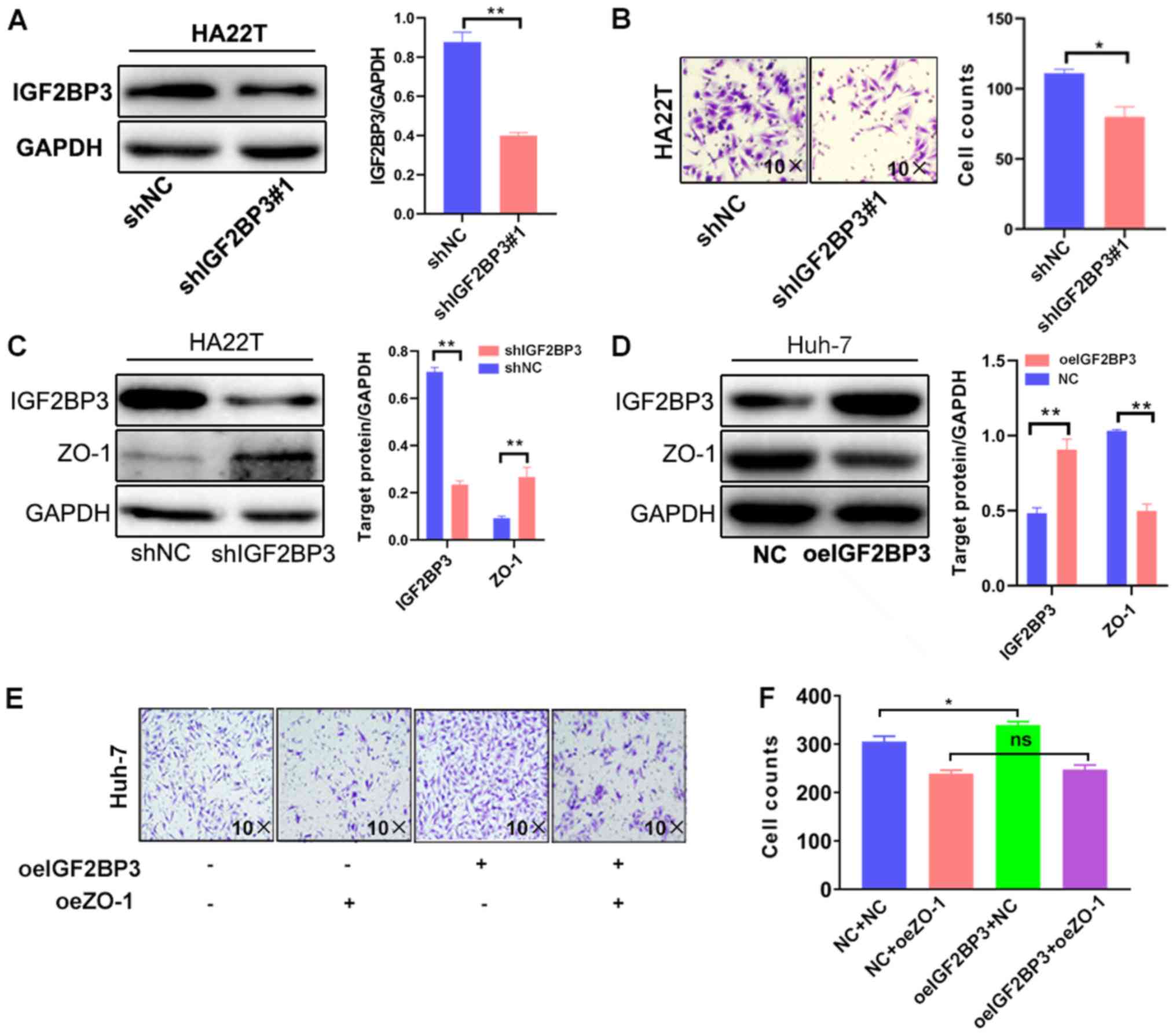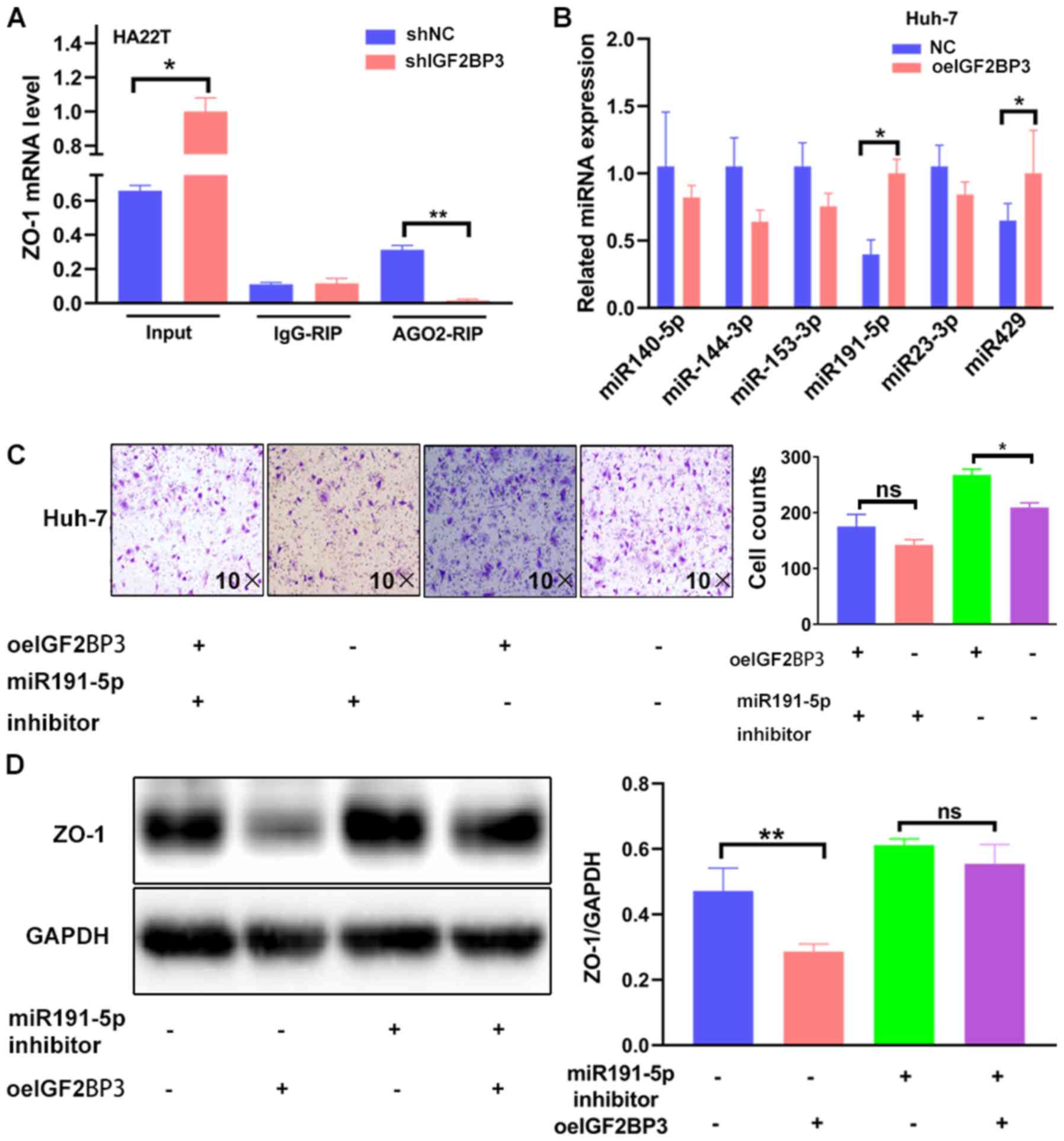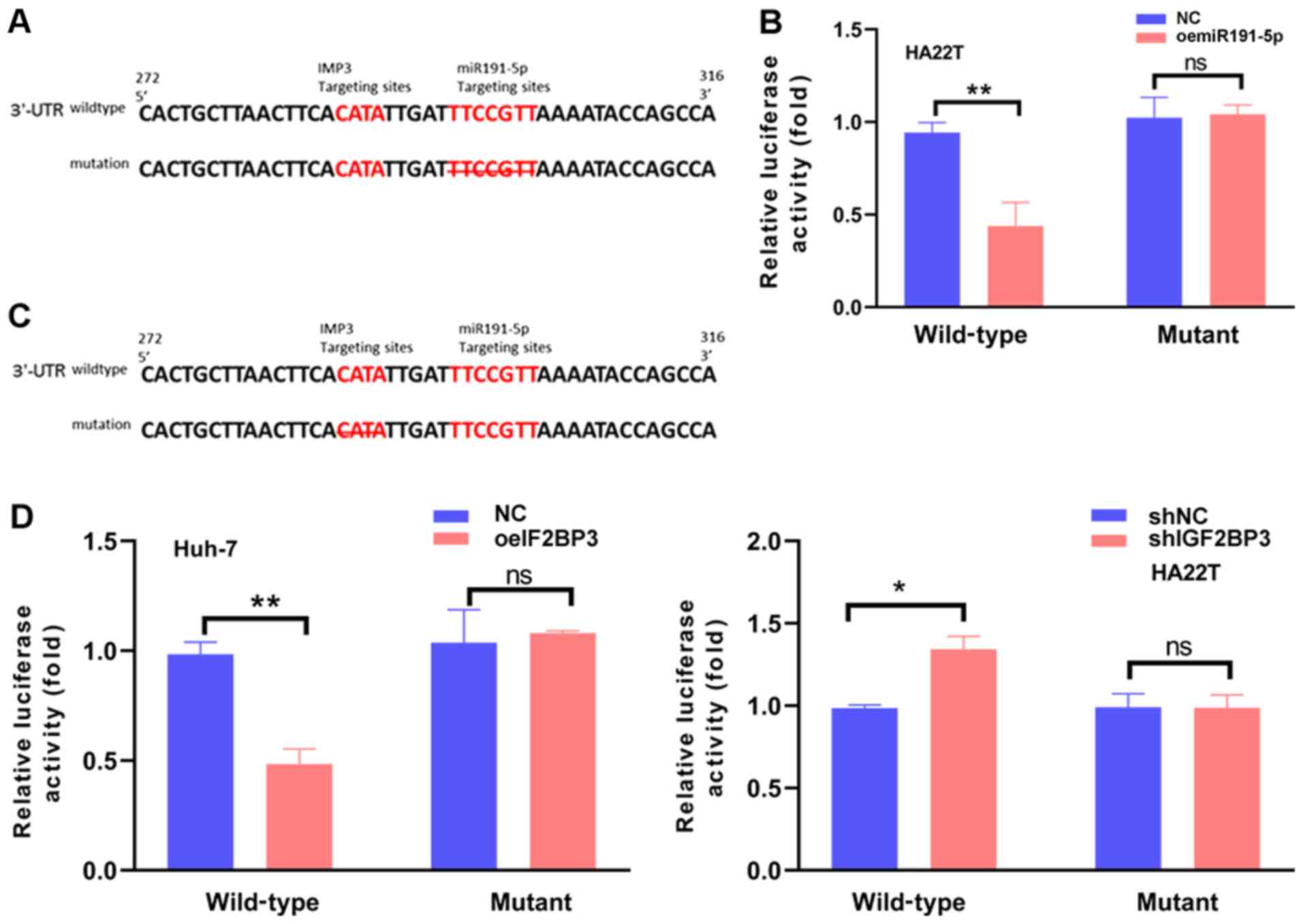|
1
|
Chen W, Zheng R, Baade PD, Zhang S, Zeng
H, Bray F, Jemal A, Yu XQ and He J: Cancer statistics in China,
2015. CA Cancer J Clin. 66:115–132. 2016. View Article : Google Scholar : PubMed/NCBI
|
|
2
|
Miller KD, Siegel RL, Lin CC, Mariotto AB,
Kramer JL, Rowland JH, Stein KD, Alteri R and Jemal A: Cancer
treatment and survivorship statistics, 2016. CA Cancer J Clin.
66:271–289. 2016. View Article : Google Scholar : PubMed/NCBI
|
|
3
|
Nielsen J, Christiansen J, Lykke-Andersen
J, Johnsen AH, Wewer UM and Nielsen FC: A family of insulin-like
growth factor II mRNA-binding proteins represses translation in
late development. Mol Cell Biol. 19:1262–1270. 1999. View Article : Google Scholar : PubMed/NCBI
|
|
4
|
Yaniv K and Yisraeli JK: The involvement
of a conserved family of RNA binding proteins in embryonic
development and carcinogenesis. Gene. 287:49–54. 2002. View Article : Google Scholar : PubMed/NCBI
|
|
5
|
Mueller F, Bommer M, Lacher U, Ruhland C,
Stagge V, Adler G, Gress TM and Seufferlein T: KOC is a novel
molecular indicator of malignancy. Br J Cancer. 88:699–701. 2003.
View Article : Google Scholar : PubMed/NCBI
|
|
6
|
Ohashi R, Sangen M, Namimatsu S, Takei H
and Naito Z: IMP3 contributes to poor prognosis of patients with
metaplastic breast carcinoma: A clinicopathological study. Ann
Diagn Pathol. 31:30–35. 2017. View Article : Google Scholar : PubMed/NCBI
|
|
7
|
Samanta S, Sun H, Goel HL, Pursell B,
Chang C, Khan A, Greiner DL, Cao S, Lim E, Shultz LD and Mercurio
AM: IMP3 promotes stem-like properties in triple-negative breast
cancer by regulating SLUG. Oncogene. 35:1111–1121. 2016. View Article : Google Scholar : PubMed/NCBI
|
|
8
|
Lu D, Yang X, Jiang NY, Woda BA, Liu Q,
Dresser K, Mercurio AM, Rock KL and Jiang Z: IMP3, a new biomarker
to predict progression of cervical intraepithelial neoplasia into
invasive cancer. Am J Surg Pathol. 35:1638–1645. 2011. View Article : Google Scholar : PubMed/NCBI
|
|
9
|
Li C, Rock KL, Woda BA, Jiang Z, Fraire AE
and Dresser K: IMP3 is a novel biomarker for adenocarcinoma in situ
of the uterine cervix: An immunohistochemical study in comparison
with p16(INK4a) expression. Mod Pathol. 20:242–247. 2007.
View Article : Google Scholar : PubMed/NCBI
|
|
10
|
Tschirdewahn S, Panic A, Püllen L, Harke
NN, Hadaschik B, Riesz P, Horváth A, Szalontai J, Nyirády P, Baba
HA, et al: Circulating and tissue IMP3 levels are correlated with
poor survival in renal cell carcinoma. Int J Cancer. 145:531–539.
2019.PubMed/NCBI
|
|
11
|
Jiang Z, Chu PG, Woda BA, Rock KL, Liu Q,
Hsieh CC, Li C, Chen W, Duan HO, McDougal S and Wu CL: Analysis of
RNA-binding protein IMP3 to predict metastasis and prognosis of
renal-cell carcinoma: A retrospective study. Lancet Oncol.
7:556–564. 2006. View Article : Google Scholar : PubMed/NCBI
|
|
12
|
Chen ST, Jeng YM, Chang CC, Chang HH,
Huang MC, Juan HF, Hsu CH, Lee H, Liao YF, Lee YL, et al:
Insulin-like growth factor II mRNA-binding protein 3 expression
predicts unfavorable prognosis in patients with neuroblastoma.
Cancer Sci. 102:2191–2198. 2011. View Article : Google Scholar : PubMed/NCBI
|
|
13
|
Jeng YM, Chang CC, Hu FC, Chou HY, Kao HL,
Wang TH and Hsu HC: RNA-binding protein insulin-like growth factor
II mRNA-binding protein 3 expression promotes tumor invasion and
predicts early recurrence and poor prognosis in hepatocellular
carcinoma. Hepatology. 48:1118–1127. 2008. View Article : Google Scholar : PubMed/NCBI
|
|
14
|
Yan J, Wei Q, Jian W, Qiu B, Wen J, Liu J,
Fu B, Zhou X and Zhao T: IMP3 predicts invasion and prognosis in
human lung adenocarcinoma. Lung. 194:137–146. 2016. View Article : Google Scholar : PubMed/NCBI
|
|
15
|
Li W, Liu D, Chang W, Lu X, Wang YL and
Wang H, Zhu C, Lin HY, Zhang Y, Zhou J and Wang H: Role of IGF2BP3
in trophoblast cell invasion and migration. Cell Death Dis.
5:e10252014. View Article : Google Scholar : PubMed/NCBI
|
|
16
|
Taniuchi K, Furihata M, Hanazaki K, Saito
M and Saibara T: IGF2BP3-mediated translation in cell protrusions
promotes cell invasiveness and metastasis of pancreatic cancer.
Oncotarget. 5:6832–6845. 2014. View Article : Google Scholar : PubMed/NCBI
|
|
17
|
Pasiliao CC, Chang CW, Sutherland BW,
Valdez SM, Schaeffer D, Yapp DT and Ng SS: The involvement of
insulin-like growth factor 2 binding protein 3 (IMP3) in pancreatic
cancer cell migration, invasion, and adhesion. BMC Cancer.
15:2662015. View Article : Google Scholar : PubMed/NCBI
|
|
18
|
Jens M and Rajewsky N: Competition between
target sites of regulators shapes post-transcriptional gene
regulation. Nat Rev Genet. 16:113–126. 2015. View Article : Google Scholar : PubMed/NCBI
|
|
19
|
Bell JL, Wächter K, Mühleck B, Pazaitis N,
Köhn M, Lederer M and Hüttelmaier S: Insulin-like growth factor 2
mRNA-binding proteins (IGF2BPs): Post-transcriptional drivers of
cancer progression? Cell Mol Life Sci. 70:2657–2675. 2013.
View Article : Google Scholar : PubMed/NCBI
|
|
20
|
Jiang W, Cheng X, Wang T, Song X, Zheng Y
and Wang L: LINC00467 promotes cell proliferation and metastasis by
binding with IGF2BP3 to enhance the mRNA stability of TRAF5 in
hepatocellular carcinoma. J Gene Med. 22:e31342020. View Article : Google Scholar : PubMed/NCBI
|
|
21
|
Mizutani R, Imamachi N, Suzuki Y, Yoshida
H, Tochigi N, Oonishi T, Suzuki Y and Akimitsu N: Oncofetal protein
IGF2BP3 facilitates the activity of proto-oncogene protein eIF4E
through the destabilization of EIF4E-BP2 mRNA. Oncogene.
35:3495–3502. 2016. View Article : Google Scholar : PubMed/NCBI
|
|
22
|
Jønson L, Christiansen J, Hansen TVO,
Vikeså J, Yamamoto Y and Nielsen FC: IMP3 RNP safe houses prevent
miRNA-directed HMGA2 mRNA decay in cancer and development. Cell
Rep. 7:539–551. 2014. View Article : Google Scholar : PubMed/NCBI
|
|
23
|
Ennajdaoui H, Howard JM, Sterne-Weiler T,
Jahanbani F, Coyne DJ, Uren PJ, Dargyte M, Katzman S, Draper JM,
Wallace A, et al: IGF2BP3 modulates the interaction of
invasion-associated transcripts with RISC. Cell Rep. 15:1876–1883.
2016. View Article : Google Scholar : PubMed/NCBI
|
|
24
|
González-Mariscal L, Betanzos A and
Avila-Flores A: MAGUK proteins: Structure and role in the tight
junction. Semin Cell Dev Biol. 11:315–324. 2000. View Article : Google Scholar : PubMed/NCBI
|
|
25
|
Nagai T, Arao T, Nishio K, Matsumoto K,
Hagiwara S, Sakurai T, Minami Y, Ida H, Ueshima K, Nishida N, et
al: Impact of tight junction protein ZO-1 and twist expression on
postoperative survival of patients with hepatocellular carcinoma.
Dig Dis. 34:702–707. 2016. View Article : Google Scholar : PubMed/NCBI
|
|
26
|
Zhang X, Wang L, Zhang H, Tu F, Qiang Y
and Nie C: Decreased expression of ZO-1 is associated with tumor
metastases in liver cancer. Oncol Lett. 17:1859–1864.
2019.PubMed/NCBI
|
|
27
|
Hsu YL, Hung JY, Chang WA, Lin YS, Pan YC,
Tsai PH, Wu CY and Kuo PL: Hypoxic lung cancer-secreted exosomal
miR-23a increased angiogenesis and vascular permeability by
targeting prolyl hydroxylase and tight junction protein ZO-1.
Oncogene. 36:4929–4942. 2017. View Article : Google Scholar : PubMed/NCBI
|
|
28
|
Aden DP, Fogel A, Plotkin S, Damjanov I
and Knowles BB: Controlled synthesis of HBsAg in a differentiated
human liver carcinoma-derived cell line. Nature. 282:615–616. 1979.
View Article : Google Scholar : PubMed/NCBI
|
|
29
|
Knowles BB, Howe CC and Aden DP: Human
hepatocellular carcinoma cell lines secrete the major plasma
proteins and hepatitis B surface antigen. Science. 209:497–499.
1980. View Article : Google Scholar : PubMed/NCBI
|
|
30
|
López-Terrada D, Cheung SW, Finegold MJ
and Knowles BB: Hep G2 is a hepatoblastoma-derived cell line. Hum
Pathol. 40:1512–1515. 2009. View Article : Google Scholar
|
|
31
|
Chang C, Lin Y, O-Lee TW, Chou CK, Lee TS,
Liu TJ, P'eng FK, Chen TY and Hu CP: Induction of plasma protein
secretion in a newly established human hepatoma cell line. Mol Cell
Biol. 3:1133–1137. 1983. View Article : Google Scholar : PubMed/NCBI
|
|
32
|
Nakabayashi H, Taketa K, Yamane T,
Miyazaki M, Miyano K and Sato J: Phenotypical stability of a human
hepatoma cell line, HuH-7, in long-term culture with chemically
defined medium. Gan. 75:151–158. 1984.PubMed/NCBI
|
|
33
|
Stepanenko AA and Dmitrenko VV: HEK293 in
cell biology and cancer research: Phenotype, karyotype,
tumorigenicity, and stress-induced genome-phenotype evolution.
Gene. 569:182–190. 2015. View Article : Google Scholar : PubMed/NCBI
|
|
34
|
Livak KJ and Schmittgen TD: Analysis of
relative gene expression data using real-time quantitative PCR and
the 2(-Delta Delta C(T)) method. Methods. 25:402–408. 2001.
View Article : Google Scholar : PubMed/NCBI
|
|
35
|
Chen X, Zhao M, Huang J, Li Y, Wang S,
Harrington CA, Qian DZ, Sun XX and Dai MS: MicroRNA-130a suppresses
breast cancer cell migration and invasion by targeting FOSL1 and
upregulating ZO-1. J Cell Biochem. 119:4945–4956. 2018. View Article : Google Scholar : PubMed/NCBI
|
|
36
|
Liu M, Yang J, Zhang Y, Zhou Z, Cui X,
Zhang L, Fung KM, Zheng W, Allard FD, Yee EU, et al: ZIP4 promotes
pancreatic cancer progression by repressing ZO-1 and claudin-1
through a ZEB1-dependent transcriptional mechanism. Clin Cancer
Res. 24:3186–3196. 2018. View Article : Google Scholar : PubMed/NCBI
|
|
37
|
Lederer M, Bley N, Schleifer C and
Hüttelmaier S: The role of the oncofetal IGF2 mRNA-binding protein
3 (IGF2BP3) in cancer. Semin Cancer Biol. 29:3–12. 2014. View Article : Google Scholar : PubMed/NCBI
|
|
38
|
Li D, Yan D, Tang H, Zhou C, Fan J, Li S,
Wang X, Xia J, Huang F, Qiu G and Peng Z: IMP3 is a novel
prognostic marker that correlates with colon cancer progression and
pathogenesis. Ann Surg Oncol. 16:3499–3506. 2009. View Article : Google Scholar : PubMed/NCBI
|
|
39
|
Li S, Cha J, Kim J, Kim KY, Kim HJ, Nam W
and Cha IH: Insulin-like growth factor II mRNA-binding protein 3: A
novel prognostic biomarker for oral squamous cell carcinoma. Head
Neck. 33:368–374. 2011.PubMed/NCBI
|
|
40
|
Farazi TA, Spitzer JI, Morozov P and
Tuschl T: miRNAs in human cancer. J Pathol. 223:102–115. 2011.
View Article : Google Scholar : PubMed/NCBI
|
|
41
|
Winter J, Jung S, Keller S, Gregory RI and
Diederichs S: Many roads to maturity: microRNA biogenesis pathways
and their regulation. Nat Cell Biol. 11:228–234. 2009. View Article : Google Scholar : PubMed/NCBI
|
|
42
|
Farazi TA, Hoell JI, Morozov P and Tuschl
T: MicroRNAs in human cancer. MicroRNA cancer regulation. Schmitz
U, Wolkenhauer O and Vera J: Dordrecht Springer Netherlands. 1–20.
2013. View Article : Google Scholar
|
|
43
|
Di Leva G and Croce CM: Roles of small
RNAs in tumor formation. Trends Mol Med. 16:257–267. 2010.
View Article : Google Scholar : PubMed/NCBI
|
|
44
|
Lu J, Getz G, Miska EA, Alvarez-Saavedra
E, Lamb J, Peck D, Sweet-Cordero A, Ebert BL, Mak RH, Ferrando AA,
et al: MicroRNA expression profiles classify human cancers. Nature.
435:834–838. 2005. View Article : Google Scholar : PubMed/NCBI
|
|
45
|
Meister G, Landthaler M, Patkaniowska A,
Dorsett Y, Teng G and Tuschl T: Human Argonaute2 mediates RNA
cleavage targeted by miRNAs and siRNAs. Mol Cell. 15:185–197. 2004.
View Article : Google Scholar : PubMed/NCBI
|
|
46
|
Jing Q, Huang S, Guth S, Zarubin T,
Motoyama A, Chen J, Di Padova F, Lin SC, Gram H and Han J:
Involvement of microRNA in AU-rich element-mediated mRNA
instability. Cell. 120:623–634. 2005. View Article : Google Scholar : PubMed/NCBI
|
|
47
|
Glisovic T, Bachorik JL, Yong J and
Dreyfuss G: RNA-binding proteins and post-transcriptional gene
regulation. FEBS Lett. 582:1977–1986. 2008. View Article : Google Scholar : PubMed/NCBI
|
|
48
|
Anderson JM: Cell signalling: MAGUK magic.
Curr Biol. 6:382–384. 1996. View Article : Google Scholar : PubMed/NCBI
|
|
49
|
Gottardi CJ, Arpin M, Fanning AS and
Louvard D: The junction-associated protein, zonula occludens-1,
localizes to the nucleus before the maturation and during the
remodeling of cell-cell contacts. Proc Natl Acad Sci USA.
93:10779–10784. 1996. View Article : Google Scholar : PubMed/NCBI
|
|
50
|
Hoover KB, Liao SY and Bryant PJ: Loss of
the tight junction MAGUK ZO-1 in breast cancer: Relationship to
glandular differentiation and loss of heterozygosity. Am J Pathol.
153:1767–1773. 1998. View Article : Google Scholar : PubMed/NCBI
|



















